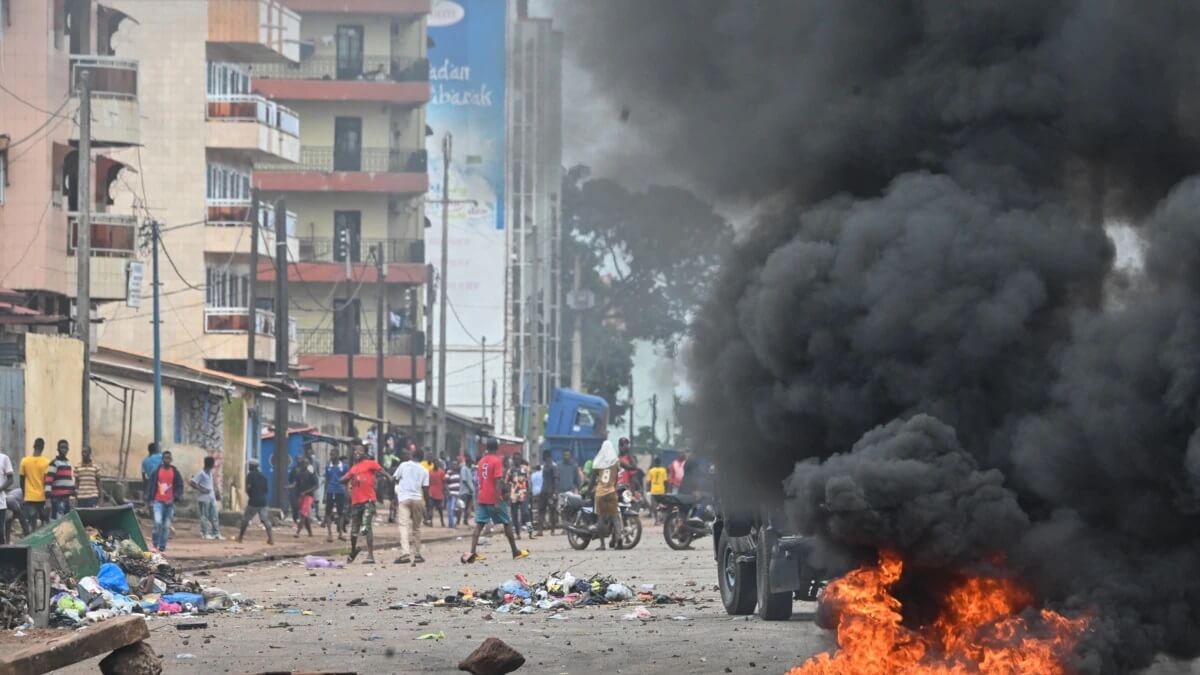Guinean opposition coalition National Front for the Defence of the Constitution (FNDC) has called for nationwide protests next week after the military junta dissolved it, denouncing Col. Mamady Doumbouya’s “unilateral and authoritarian management of the transition” and lack of “credible dialogue” to restore civilian rule.
In a statement on Monday, the FNDC condemned the junta’s “chronic attitude of defiance” towards ECOWAS’ (Economic Community of West African States) instruction to frame a shorter transition timeline, while also lambasting its “illegal use of lethal weapons” against protesters.
On Saturday, Doumbouya issued a decree that dissolved the FNDC, accusing it of orchestrating “violent attacks (perpetrated) during banned demonstrations, attacks against individuals who do not share their ideology, and targeted attacks against the security forces.” The banning order added that the political coalition functions as “combat groups and private militias threatening national unity, public peace, and cohabitation.”
1/ HRF condemns the ban imposed on #Guinea's leading pro-democracy movement, the National Front for the Defense of the Constitution (FNDC), by the country's military regime in a growing crackdown on dissent. https://t.co/DUICFyC5fc
— Human Rights Foundation (@HRF) August 9, 2022
Opposition leader Cellou Dalein Diallo described the ban as “a blow to freedom, justice, democracy, and peace.” Likewise, the Guinean Organisation for the Defence of Human Rights (OGDH) has said that it is “very concerned by the turn of events,” warning that “confiscating civil liberties or silencing all dissenting voices” would further complicate matters.
The FNDC movement is a coalition of political parties, trade unions, and civil groups that has been the fulcrum of multiple protests in the west African nation. On July 28 and 29, it led a citizen march to express dissatisfaction against the junta’s attempts to delay a democratic return to civilian rule. The demonstrations turned violent and five people were killed, with two FNDC leaders—Oumar Sylla and Ibrahima Diallo—jailed over their alleged “participation in a prohibited gathering, looting, destruction of public and private property, assault and battery.”
Demonstrations were suspended on July 30 after ECOWAS Chairperson Umaro Sissoco Embalo appealed for calm. The group declared a week-long truce to “give the mediation a chance to find a favourable way out of the crisis in Guinea.” To this end, protests were again stalled on August 4.
🇬🇳 #Guinea: Several killed, injured, arrested during protests on 28 & 29 July against the handling of the transition by the military junta. Two @FNDC_Gn and @TlpGuinee activists were violently arrested and charged after the protests.
— CIVICUS Monitor (@CIVICUSMonitor) August 3, 2022
Country update: https://t.co/pwrRppVgSi pic.twitter.com/kx3Ab10dwC
However, after the FNDC was dissolved over the weekend, the group has now called for a stronger nationwide strike on August 17, demanding the release of its leaders and inclusive dialogue to facilitate a quick return to democratic rule.
Given that the junta has banned all political gatherings until 2025, however, Doumbouya is likely to deploy additional security personnel to quell the protests, which could potentially lead to even more deadly clashes.
The FNDC’s movement against the government pre-dates the military junta, such as when now-former President Alpha Condé announced that he would amend the constitution to contest for a third term. In fact, the widespread discontent that followed Condé’s re-election in October 2020 ultimately generated the momentum for the military coup last September, following which Doumbouya declared himself the interim president and vowed to hold elections and relinquish power to a civilian government by 2025.
The coup was denounced by ECOWAS and Guinea’s membership was suspended soon after. In fact, the junta has been at loggerheads with the west African bloc over the transition timeline, with ECOWAS urging Guinean authorities to engage in an “inclusive dialogue” to “agree on a reasonable timetable” to restore constitutional order. Since September last year, ECOWAS has frequently condemned the junta and refused to lift its suspension.
How successful the sanctions are in forcing #Mali's leaders to hold elections sooner, or if they reduce support for the junta, could influence how @ecowas_cedeao seeks to punish other coup leaders in #Guinea and #BurkinaFaso who have also snatched power over the past year. https://t.co/Oxp0T8Ol5y
— Daniel Schearf (@DanielSSchearf) February 21, 2022
Similarly, at the African Union’s (AU) Accra Summit last month, AU Chairperson and Senegalese President Macky Sall described Guinea’s 36-month transition timetable as “unthinkable.” While the ECOWAS lifted its financial sanctions on military rulers in Mali and Burkina Faso, in Guinea, it deployed former Beninese President Boni Yayi to mediate with the military government and present a fresh timeline by the end of July.
To this end, Embalo claimed that Guinea’s junta has agreed last month to shorten the transition period to 24 months, but this has not yet been confirmed by Doumbouya.
We believe that Oumar Sylla was kept in detention solely to obstruct the work of the FNDC (opposition movement) against the President Alpha Conde's decision to run for a third term. 2/2 #Guinea
— Amnesty West & Central Africa (@AmnestyWARO) August 27, 2020
With the world’s largest bauxite reserves, Guinea is endowed with mineral wealth, but has seen recurrent bouts of political instability since it won its independence from France in 1958.
Sporadic violence and conflicts have significantly disrupted socio-economic development and citizens’ welfare, with Guinea ranking amongst the poorest countries in the world. With a poverty rate of around 50% and a literacy rate of 32%, the junta’s continued rule threatens to further exacerbate the country’s woes.

